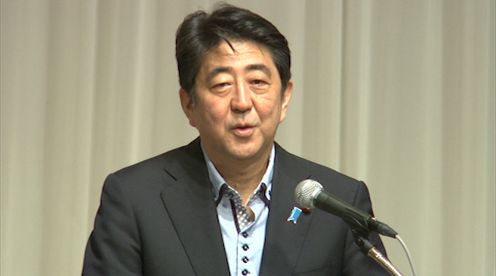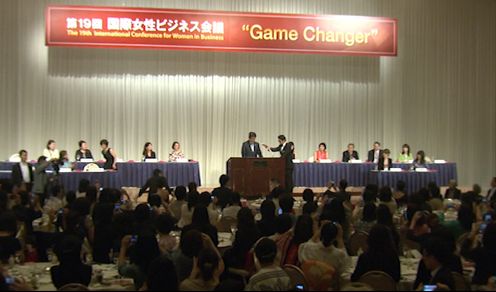Home > News > The Prime Minister in Action > July 2014 > The International Conference for Women in Business
The International Conference for Women in Business
Sunday, July 13, 2014

Photograph of the Prime Minister delivering an address (1)

Photograph of the Prime Minister delivering an address (2)
Prime Minister Shinzo Abe attended the 19th International Conference for Women in Business held in Tokyo.
The Prime Minister said in his address,
I am overwhelmed by the drive and passion of the women in attendance today, who are active on the frontlines of business. Unfortunately, I was unable to attend the conference last year due to a scheduling conflict. As such, I wanted nothing more than to have the opportunity to attend this year.
Yesterday, I returned from my official visits to New Zealand, Australia, and Papua New Guinea. Now I am standing before you, eager to directly convey my vision and thoughts on women in society. Last year, I was merely able to send a message to this conference in my stead.
In this message I made a specific pledge to eliminate the word "childcare waiting list" from our vocabulary. I decided to increase the capacity of childcare facilities by 400,000 children. Over the last two years we have proceeded with the utmost sense of urgency and have already increased capacity by 200,000 children. We have also made progress with the opening of more daycare centers, which has made it possible for a large number of women to decide to begin new jobs. Over the last one year some 530,000 women have started new jobs. I also stated that the Government is aiming for 30 percent of leadership positions in a variety of organizations to be filled by women by 2020.
In April 2013, I invited leaders of the three economic associations to the Prime Minister's Office. I asked them to ensure that all publicly listed companies in Japan have at least one female member on their board of directors. Over the last one year, women have steadily been appointed as directors in sectors like finance or trading, which until now have been considered the domain of men. I am sure there are also plenty of potential directors with us here today. During the heat of summer there are no doubt a large number of women out there pursuing their dreams and trying hard to find employment. Many of these women will likely become the key decision makers of corporate Japan and of ministries and agencies.
Every journey begins with a single step. In the recruitment of national public servants in 2015, we will ensure that 30% of new recruits are women. Change is surely in the air. However, the real challenge starts now to see if we can truly achieve a society in which all women shine. On June 24 a Cabinet decision was made on the new Growth Strategy. A major pillar of this strategy is facilitating women's active role. Many women are relieved when they finally manage to find a daycare for their children after much time and effort, only to find that subsequently, when it is time to enroll their children in elementary school, it is now difficult to find after-school daycare. To break through the "first grade wall" we are determined to eliminate childcare waiting lists for after-school daycare as well. Over the next five years we will increase the capacity of facilities for these children by 300,000 children. I would like homemakers, who have rich experience in childcare activities, to harness their abilities and to continue to play an even more active role. We will create a new certification so that these women can play an active role on the frontlines of daycare centers and other facilities as childcare support workers.
Investors are closely monitoring the state of women's active engagement at companies. Companies must disclose information about the proportion of directors who are women in their financial reports. Companies that work hard toward the promotion of women's careers will receive greater opportunities for Government procurement orders and the Government will encourage the initiatives of companies in this regard. On the day the Cabinet decision was made on the Growth Strategy I invited the leaders of the three economic associations to once again visit the Prime Minister's Office, where I asked them to set targets and take action to promote the promotion of women's careers at companies. The leaders of the three economic organizations came to the Prime Minister's Office on countless occasions. I may have come across as very persistent, but the important thing is that we must steadily move forward with the promotion of women's careers.
I am making utmost efforts to revitalize Japan's economy through the three arrows of Abenomics. Japan's economic revitalization is certainly beginning to make progress. At the same time, I fully understand that there are still people and many communities that have yet to fully experience this economic recovery. There is still much to do. Therefore, we must not rest on our laurels. As we continue with these efforts, I am always filled with courage and motivation from the countless hardworking women I have met on my official visits abroad.
During my recent visit to Oceania, my first stop was New Zealand, which is known for being a powerhouse in rugby. I had a chance to meet with female high school students from Shimane Prefecture who are learning firsthand about New Zealand's rugby prowess, far away from their parents. Rugby will become an official Olympic sport starting from the 2020 Tokyo Olympic Games. The year before that, in 2019, the Rugby World Cup will be held in Japan. During my visit I was able to see firsthand a team of female high school students working hard in preparation for 2019 and 2020.
I would also like to share with you the story of a woman who moved from Yokohama to Otsuchi Town, which suffered extensive damage in the Great East Japan Earthquake. She launched the Otsuchi Recovery Sashiko Project, a project utilizing sashiko, a traditional embroidery technique that is popular in the Tohoku region, to create new jobs for the local community. She has thus helped to restore meaning to the lives of those affected by the Great East Japan Earthquake.
In addition, in Shimane Prefecture there exists the Regional Vitalization Cooperation Volunteers, a domestic version of the Japan Overseas Cooperation Volunteers and an organization in which youth volunteers give back to the community. Many of the participants are young women. Among them, there was a young woman who had come to the Oki Islands. Making the most of her experience in human resource development at a major game company, she has created more appealing school educational programs. In this time of declining birthrates, her efforts have helped to increase the number of classes in Shimane Prefecture. As a volunteer she has moved to Shimane in a true effort to help vitalize the regions. She has acted on her ideas, pursuing many different things, and has produced great results.
I believe we can all contribute to society in our own way. To every extent possible I would like to support those women who are passionate about fulfilling their dreams. I understand that the theme for this year's conference is "Game Changer ." There is no way we will be able to realize a society in which all women shine if we simply pursue the promotion of women's careers in name only. We need to incorporate the fresh perspectives of women in corporate management, which in turn will change our work styles. This truly is tantamount to changing the rules of the game.
In my message to this conference last year I quoted Huffington Post founder Ms. Arianna Huffington. She said that if Lehman Brothers had been "Lehman Brothers and Sisters" the firm would have survived.
Employing new rules that incorporate the perspectives of women will help companies avoid risk and enhance competitiveness. I also believe this will enhance the ability of Japan's economy to grow in a sustainable manner. I believe that all women value their careers and their private life. As such, as the number of women in workplaces grows and they become responsible for making important decisions, these organizations will begin to achieve a work-life balance. These organizations should also achieve highly productive work styles. One of my greatest undertakings is to seek to create a society in which all women shine.
Unfortunately, there are likely still many people who are influenced by a male-centric viewpoint. I believe once we eliminate such viewpoints that are inhibiting the active role of women we will be able to achieve a society in which all women shine. However, these efforts cannot simply end here in Japan.
In September 2014, women who shine from around the world will come to Japan. We will host an international symposium on achieving a society in which all women shine. Ms. Christine Lagarde of the IMF and other women who play an active role around the world will join us. This will mark the start of "Womenomics" together with women who are already thriving in Japan. Regrettably, Japan has not always been a frontrunner when it comes to the active role of women. This is going to change. Japan's efforts will reverberate around the globe, helping to realize a world where all women can shine, both in emerging and developed countries. Japan will play a leading role in bringing vitality to the women of the world. This is the Japan I would like to create together with you. I invite you to join us in taking on this challenge. Together we can build a new society.
I hear that of the members of the Abe Cabinet, Minister Masako Mori and Minister Tomomi Inada are participating in the conference. These two ministers represent central pillars of the Abe Cabinet, and together they are in charge of very challenging roles. Recently I asked Minister Masako Mori to be the Minister in charge of the Act on the Protection of Specially Designated Secrets, which is a very complicated piece of legislation. I understand that as a result of her becoming the Minister in charge, her daughter faced a number of difficulties at school. Nevertheless, she has managed to overcome these challenges in a very successful manner.
Meanwhile, Minister Inada has been assigned to the very challenging task of regulatory reform and breaking down the solid rock of vested interests. She has risen admirably to the task and is tackling many reforms that were not achieved for a long period of time. For example, the LDP has unfortunately not been able to reform agricultural cooperatives. This reform process is being led by the efforts of Minister Inada. The same can be said of the medical field. The same, too, can be said of the labor field as well. These vested interests are now being broken down by the ideas, sensitivities and power of women.
Women now occupy two of the three primary leadership positions within the LDP. The Secretary-General, Chairman of the General Council, and Chairman of the Policy Research Council are the three important positions within the party, and these positions are taken up by Mr. Shigeru Ishiba, Ms. Sanae Takaichi and Ms. Seiko Noda, respectively. I believe Mr. Ishiba may be feeling a little isolated being surrounded on both sides by women. I think this is exactly what many women have felt in the workplace, and now Mr. Ishiba is sharing the same experience.
I believe passionate discussions will take place throughout the conference today. In closing, I sincerely hope that this conference in Odaiba will help jumpstart a new era in facilitating the active role of women, and I look forward to working with all of you toward this end."

